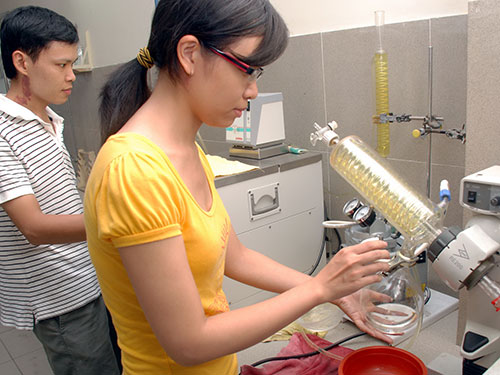

In a well-known case, two vice presidents of the Hanoi University of Technology, one of the largest and most prestigious schools in Vietnam, were denounced for plagiarizing others’ theses for their doctoral dissertations.
Hoang Xuan Que, a lecturer of the Hanoi Economics University, had his doctorate revoked by the Ministry of Education and Training (MOET) after the ministry discovered that 30 percent of his dissertation was copied from another dissertation by Dr. Mai Thanh Que of Hanoi Banking Academy.
Dr. Le Thi Nam Giang from the HCM City Law University, secretary general of the HCM City Intellectual Property Association, attributed the “popularity” of plagiarism to unclear legal regulations.
She noted that the Intellectual Property (IP) Law and other legal documents did not define or address “quotations”, and did not clarify when documents can be quoted without permission.
A legal document released by MOET stipulates that researchers do not have to ask for permission to quote common well-known knowledge.
However, Giang noted that it is unclear what “common knowledge” and “well-known” knowledge mean, since there are no explanations.
Article No 25 of the IP Law stipulates that researchers do not have to ask for permission when “reasonably quoting” others’ work, that is, in a way that does not misrepresent the authors’ ideas. However, it is also unclear what “quote reasonably” means.
“What does ‘reasonably’mean? Can someone copy five pages or 500 pages of someone else’s’ work?” Giang asked.
“It is very difficult to sue plagiarists with such a legal framework where loopholes exist,” Giang said.
Tran Thi Kim Anh from the University of Social Sciences and Humanities said many lecturers refuse to give guidance to students to write theses, because their ideas and contributions are not recognized by the students.
Anh said that in many cases, students were not capable of writing their theses, and lecturers had to add their own information and knowledge to students’ theses. Sometimes 70 percent of the content of theses comes from lecturers. However, the theses do not given them any authorial credit.
Meanwhile, a researcher from the HCM City National University said he knows a lecturer who plagiarized his student’s thesis and gave a report on the thesis at a workshop, saying he was the co-author of the work.
Current laws also do not clearly explain the responsibilities of the involved parties and what they have to do in case plagiarism is found.
A lecturer at the University of Social Sciences and Humanities said that if plagiarism were discovered, only the plagiarists would be punished. The people who mark the dissertations and do not discover plagiarism remain innocent.
However, Giang said it was very difficult to discover plagiarism, and that in order to stop the problem, MOET needs to establish a reliable digital database for scientists and researchers to refer to when necessary.
Nguyen Anh Thi, director of the IP and Technology Transfer Center, noted that while waiting for the laws to be amended and for people to change their habit of copying others’ works, writers and students should try to protect themselves by keeping evidence of their work, which could be useful in case of disputes.